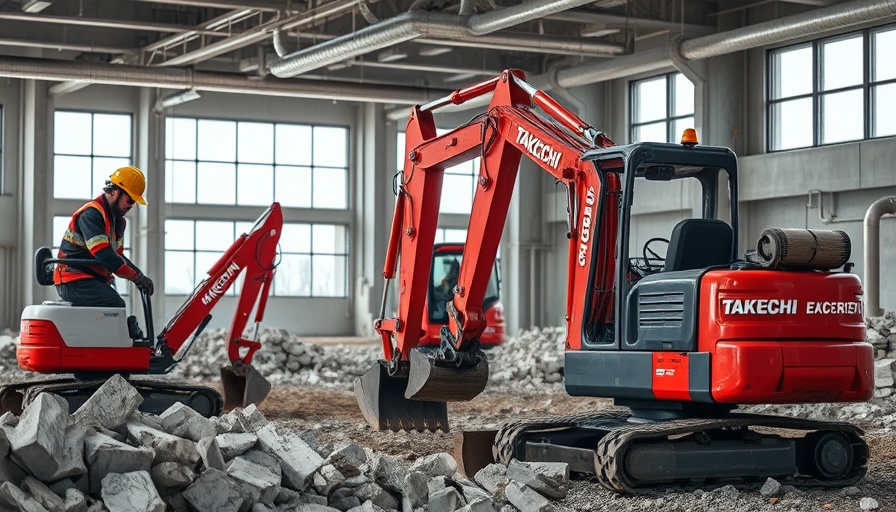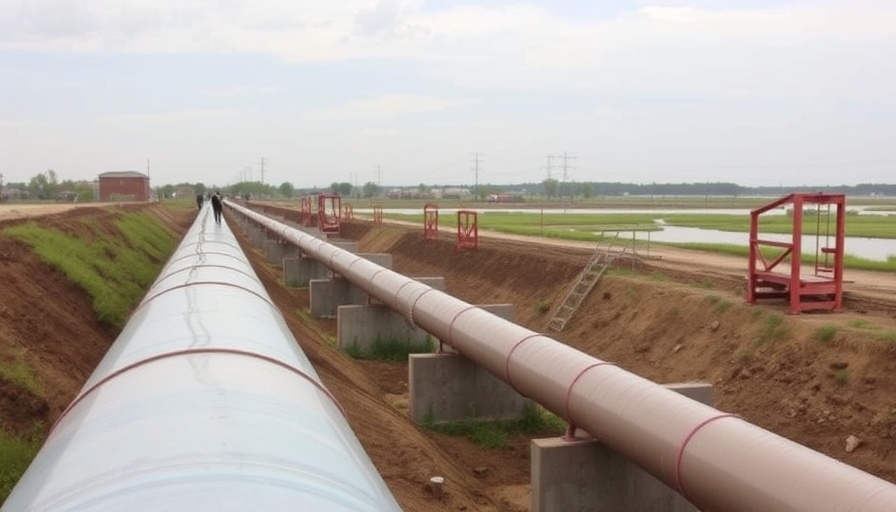
Takeuchi’s Electric Excavators: A New Era for Compact Construction Equipment
As construction sites move toward electrification, Takeuchi is making a significant stride with the unveiling of two prototypes of electric mini excavators at Bauma 2025. These innovative machines—the TB10e and TB35e—showcase the company’s commitment to creating compact, efficient, and environmentally friendly construction solutions. The TB20e mini excavator has already been introduced with a canopy, and soon will come equipped with a cab to enhance operator comfort and productivity.
Why Choose Electric? The Growing Need for Sustainable Construction Solutions
The construction industry is increasingly under pressure to reduce its carbon footprint, paralleled by a global shift toward sustainability. Electric equipment like the Takeuchi mini excavators not only produce far fewer emissions than their diesel counterparts but often come with lower operating costs over time. By integrating electric machinery, contractors can build a more sustainable business model that contributes to environmental conservation and meets regulatory demands for reduced emissions.
Exploring the TB10e: Compact Design for Tight Spaces
The TB10e is designed for tight urban environments where traditional machinery may struggle. Its compact dimensions and operating weight of only 2,600 pounds make it an excellent choice for residential projects and small job sites. With a dig depth of 5.8 feet and a maximum reach of 10.8 feet, this mini excavator delivers impressive capabilities, ensuring that contractors don’t have to compromise on performance despite size limitations. The machine’s battery provides up to four hours of operation in Eco mode, making it a viable choice for contractors focusing on efficiency.
Introducing the TB35e: A Powerhouse for Larger Jobs
The TB35e, marking the largest electric excavator in Takeuchi’s lineup, weighs in at 8,730 pounds. This powerhouse is designed for more demanding applications, delivering a maximum dig depth of 10.5 feet and a maximum reach of 17.8 feet. With a bucket breakout force of 6,092 pound-feet, contractors can expect robust performance.
With runtime capabilities of three hours in Standard mode and four in Eco mode, this machine allows operators to tackle larger projects without the concern of rapid power depletion. Moreover, compatibility with various auxiliary flow options makes the TB35e versatile for a range of attachments, allowing for expanded functionality on the job site.
Charging Simplicity: Convenience and Efficiency Combined
The charging capabilities of both machines are designed to suit different operational needs. The TB10e’s external charger works with three-phase power for quick turnaround, while a single-phase onboard charger is compatible with a variety of grids, offering flexibility. For those assessing the financial implications, the upfront purchase of electric machinery may very well lead to long-term savings, not only in fuel costs but in maintenance. Electric machines generally have fewer moving parts than traditional engines, leading to reduced wear and tear.
Comfort and Usability: The New Cab Configuration for the TB20e
The upcoming cab configuration for the TB20e adds an essential layer of comfort, increasing operator productivity with ergonomics in mind. As Takeuchi mentioned, this version adds approximately 430 pounds to the machine's weight, which can contribute to stability during operation. Such specifications cater not just to the equipment’s durability but to a more humane working environment for operators, which is a growing concern in today’s industry.
Why Now is the Time for Contractors to Invest in Electric
The construction industry is evolving, and those who adapt will be best positioned for success in the future. Electric mini excavators represent a significant opportunity for contractors to modernize their fleets and address ecological responsibilities. In a time where stakeholders increasingly favor green compliance, trusting brands like Takeuchi, known for their innovation and commitment to quality, can provide a competitive edge.
Future Trends: Electric Equipment Beyond Excavation
As electric technology makes its way into more construction equipment types, we may see a shift in how contractors structure their fleet investments. The movement toward electrification suggests upcoming trends where performance and sustainability go hand-in-hand. It’s worth noting that jurisdictions are beginning to offer incentives for adopting cleaner equipment which could further push the industry in this direction.
Conclusion: Seize the Opportunity to Lead in Sustainability
Investing in electric mini excavators like the Takeuchi TB10e and TB35e not only positions your business for success in a market that increasingly mandates sustainable solutions but also empowers you to contribute to larger environmental goals. As you consider updating your fleet, remember that future-readiness is not just about keeping pace—it's about leading change. Now is the time to explore these exciting options. Contact a local dealer today to learn more about your possibilities with Takeuchi’s electric range and to pave your way toward a sustainable future.
 Add Row
Add Row  Add
Add 






Write A Comment